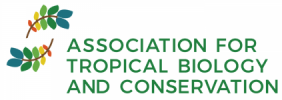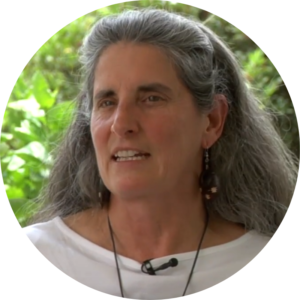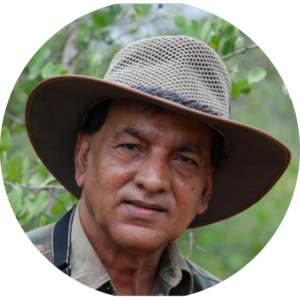ATBC 2023 Honorary Fellows
Bette Loiselle & Mewa Singh
Bette Loiselle
1- What drew you to tropical biology?
During the time of my graduate studies, considerable attention was focused on understanding and explaining high diversity in tropical systems, including hypotheses focused on the latitudinal gradient in species diversity. From afar, I was fascinated by these systems and read many of the classics that described early expeditions and experiences of natural historians and scientists. Through a bit of luck, I found myself traveling to Panama in 1980 as a field assistant to Dr. James Karr who was conducting long-term studies on bird communities along the “Pipeline Road”. My first 24 hours in that forest transformed me and I’ve been working in tropical forests since that time.
2- What are exciting research developments that happened in your field during your career?
The past 40 years in tropical ecology have seen amazing developments on so many fronts, although some things remain the same. For me, my most important piece of field equipment is still my binoculars; but at least today, I can afford better binoculars that are water-proof and can hold up in often rainy environments. Yet, the other tools of our trade have improved vastly, including recording equipment, field guides, video-cameras, autonomous recording units, camera traps, and digital access to a wealth of information in data repositories, sound libraries, digital herbaria/museums, remote sensing, climate data, among many others. During the first years of my PhD program, we shared a computer that filled a small room and used punch cards to process data. By the time I finished, I was able to use a word processor and my own computer to write and edit my dissertation! These new tools and computer/analytical power enabled us to better tackle long-standing and new hypotheses about patterns and processes in tropical systems, as has a movement to conduct research in multi-, inter- and trans-disciplinary teams.
3- What is your favorite memory of fieldwork?
Defining a favorites memory is an impossible task – I have been fortunate to have so many favorite memories. These memories include the long but marvelous treks between El Plastico/Rara Avis to La Selva with a group of talented OTS graduate students, seeing mountain gorillas in their natural habitats in Rwanda, watching a tapir swim across a small stream on the Puma plot, taking out banded birds from mist-nets and discovering when we first captured these feathered friends and where, observing manakins dance on their leks, and observing students and their delight at the first time they have seen blue-backed manakins do their cartwheels over each other, or Golden-headed manakins do their “moon walk”, and almost every day listening to the forest wake-up as we prepare to open our mist-nets or begin observations at manakin leks.
4- What accomplishment by you and/or your research team are you most proud of?
I have had absolutely marvelous graduate students over my career with most of these students coming from the global south. I am so very proud of their professional and personal accomplishments. Many have published in the top journals, disseminated their research broadly, and have had stellar careers in academia, non-governmental organizations, and research institutes. From our own research, much of which was in collaboration with Dr. John Blake, we have contributed I hope to a better understanding of the ecological role of birds as seed dispersers and the population ecology and dynamics of tropical birds, including especially, manakins.
5- What role did the ATBC play in your career?
I have been a member of ATBC for as long as I can remember, and ATBC has been extremely influential in building and strengthening my professional network, allowing me to learn more broadly about tropical biology and conservation through its meetings and excellent journal Biotropica, and contributing to a real sense of belonging in a marvelous community that shares similar passion and vision.
6- What is your advice to a young scientist starting a tropical biology and conservation career?
To borrow an answer from Dr. Victoria Reyes-Garcia, my advice is never stop going to the field. Not only does it re-energize you, but field work is essential to make observations and local connections that will help formulate your research questions and contribute to make your research more impactful in your study region.
Mewa Singh
1- What drew you to tropical biology?
Mine has been a very unusual story as an ecologist. Most people in ecology either had academic exposure to the subject or had some experiences in the wild habitats from their childhood. I grew up in a region of India, the Punjab, which is a flat agricultural land. You could count the number of occasional trees in thousands of hectares of cultivated lands. Other than many species of birds, my only encounter with a ‘wild’ animal till I was 21 years old was a visit by a solitary nomadic rhesus monkey male to our village when the whole village gathered around a big banyan tree to see the monkey! Further, I was not a biology student and studied English literature, Economics, and Psychology in my undergraduate courses. It was after my Master’s degree in Psychology that I joined Professor S.D. Singh at Meerut University who was carrying out various kinds of studies on rhesus macaques. He offered me a fellowship and I started to work on rhesus monkeys in the forests of Siwalik Hills. The research, though in the natural forest habitat of rhesus macaques, was mainly semi-field experimental where monkeys were raised under different rearing conditions. After a year of working with Prof. S D Singh, I shifted to southern India where I started research on the bonnet macaque in its natural habitats. It is from there that I continued to include more and more species of wild animals in my research, and have ended up working on the distribution patterns, ecology, behavior, and conservation of a large number of species.
2- What are exciting research developments that happened in your field during your career?
As it is known, most the research on wildlife has been carried out in Africa. Despite India being so rich in biodiversity, not much attention was paid to ecological research except the establishment of the Zoological and Botanical Surveys of India. Arguably, the systematic wildlife research in India can be traced to George Schaller and some primatologists who started filed research in India in the 1960s. Since the 1970s, there has been a tremendous interest in ecological research among the Indian scientific community and I consider this as an extraordinary development that today, as compared to many other habitat countries where still, for example, the first authors of research papers are scientists from the West, Indian ecologists are in the forefront in many areas of field research.
3- What is your favorite memory of fieldwork?
Fieldwork is always full of exciting memories and it is difficult to select one as a favorite. Among finding new habitats, working in exotic locations, often getting chased by wild elephants etc., the most hilarious story that I and my students recall and mention is when once in the middle of a night, and in the interior of a vast forest, the engine of my old jeep got heated, and my student Anand in the dark could not differentiate between two bottles lying in the jeep, and put 1.8 liters of rum in the jeep radiator! The joke later, of course, was that the jeep then was uncontrollable.
4- What accomplishment by you and/or your research team are you most proud of?
We have contributed to many areas of scientific developments in ecology and animal behavior, but we consider that our scientific work has been recognized by the authorities and policy makers, and has become the basis of establishment of several new protected areas (wildlife sanctuaries). We are also often approached by different State Governments to help mitigate human-animal negative interactions.
5- What role did the ATBC play in your career?
Unfortunately, I have been associated with the ATBC only since very recently, but now promise to play an active role in the association activities.
6- What is your advice to a young scientist starting a tropical biology and conservation career?
There are three messages that I would like to convey to the young ecological scientists. First: If you develop a passion for ecological research, especially the field ecology, during your early years, you will forever continue to enjoy field research and get thrilled by each new contribution that you make. Even now, I excitedly plan a mini party each time a new research paper of ours is published! Second: There is so much to do in ecology that there is no room for competition and rivalry. So, do not feel that someone will steal your ideas, and discuss your work freely with fellow students, and mentors. Third: My own career development has shown that having formal degrees in a discipline is not always a necessary condition to make significant contributions to a field of research. Commitment and hard work matter.


